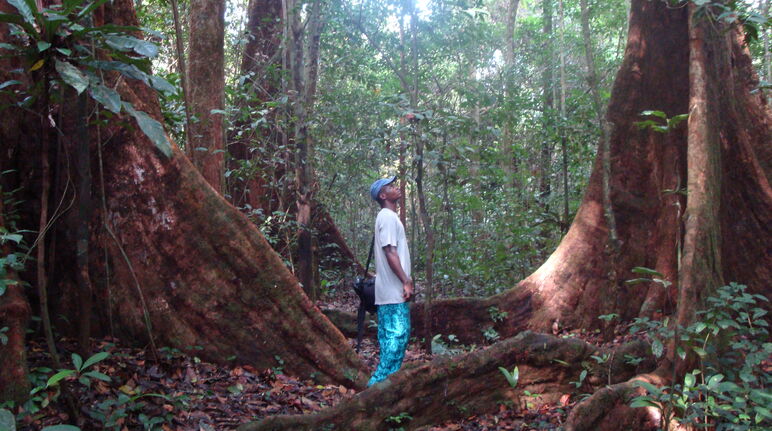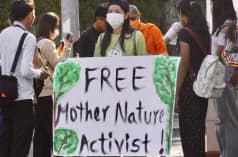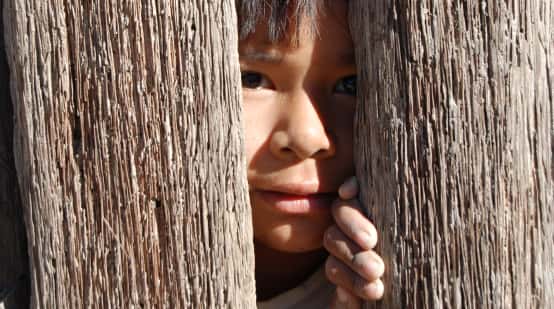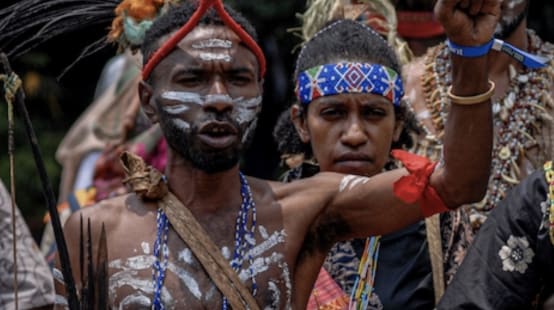Stop the depletion of forests in Cameroon!
 Cameroon is one of the few countries in the world that are home to gorillas (© anonym)
Cameroon is one of the few countries in the world that are home to gorillas (© anonym)
In Cameroon, the government wants to release 60,000 hectares of rainforest to be clear-cut for palm oil plantations. As the concession borders on Campo Ma’an National Park over a distance of fifty kilometers, the protected area is in acute danger, as are animal migration routes and the habitat of gorillas.
Call to actionTo: Mr Paul Biya, President of Cameroon
“Destroying 60,000 hectares of rainforest for palm oil – this is what a company in Cameroon wants to do. The Campo Ma’an National Park and gorillas are in danger”
Cameroon is one of the few countries in the world that are home to gorillas. 800 of them live in Campo Ma’an National Park alone. In addition to western lowland gorillas, Cameroon’s forests are also home to chimpanzees, elephants, buffalo, leopards and pangolins – the “Big Five” of the jungle.
Despite this biodiversity, the government is in the process of allocating 60,000 hectares of rainforest to the Camvert SARL company for palm oil plantations – thus opening these areas to complete deforestation.
“As the concession borders Campo Ma’an National Park over a distance of fifty kilometers, the project has serious ecological and social consequences”, warns John Manyitabot Takang, Director of the Environmental Governance Institute (EGI). “The habitat of gorillas on Dipikar Island and the migration routes of various species of animals are in danger.” The destruction of the forests also means that fishermen and Bagyeli indigenous people, who are already suffering from the effects of rubber and palm oil plantations, risk losing their livelihood.
Officially, Camvert wants to clear the area to set up a palm oil plantation.
However, an article in The Post – Weekender makes one wonder. According to the report, the company’s capital is only 7,600 euros, while project costs amount to 228,000,000 euros. The article also claims that Camvert SARL has no experience in the palm oil sector, and that its owners are unknown.
The conclusion seems obvious: Camvert does not intend to plant oil palms, it is only after the wood. This would be a particularly brazen environmental crime. It is difficult to imagine that the government has not seen through this.
Nearly 40 environmental protection organizations are fighting the destruction. Please support the resistance in Cameroon and sign our petition.
BackgroundThe total forest area to be awarded to Camvert SARL is 60,000 hectares. Between 2006 and 2016, a Dutch company had permission to cut timber there. However, it has since left the concession. This gives the government the opportunity to grant a new concession for logging or agriculture. But it can also place the areas in the hands of the local village communities as a community forest or put them under protection as part of the national park.
The government of Cameroon has proclaimed a target of preserving 30 percent of state-owned land as forest. Allowing 60,000 hectares to become part of the Camvert project contradicts this goal.
Gorilla research
Researchers have been working on the island of Dipikar since 2011 to accustom gorillas to the presence of humans. This is a prerequisite for attracting tourists or conducting behavioral studies. Germany is backing the project financially.
The Bagyeli indigenous people
The rights of the Bagyeli have already been repeatedly violated by the construction of the Chad-Cameroon Oil Pipeline (2003) and the establishment of Campo Ma’an National Park (2000), which was set up as compensation. The expansion of the deepwater port in Kribi also poses a threat to them.
The population of Cameroon has already experienced problems with plantation projects, especially with companies such as Hevecam, Socfin/Socapalm and Heracles Farms. In 2009, this US company obtained 73,000 hectares of land for palm oil plantations under mysterious circumstances. Because of his opposition to the project, environmentalist Nasako Besingi has been repeatedly arrested.
Further links
CAMEROUN: Arrondissements de Campo et Nyete : la société civile dénonce l’exploitation de 60000 ha
CAMEROUN: Arrondissements de Campo et Niete : un projet d’exploitation de 5000 ha met la controverse
Exploitation forestière: L’implantation d’une industrie fait polémique
Curious, tolerant gorillas raise hope for habituation in Cameroon
https://www.berggorilla.org/de/gorillas/laender/kamerun/
Cameroon: What poverty means to the Bagyeli people
Pipelines, Parks, and People: Bagyeli Document Land UseNear Campo Ma’an National Park
Bagyelis obtain access rights to hunt for ritual purposes in Cameroon
To: Mr Paul Biya, President of Cameroon
Mr President,
Cameroon is home to some of the most lush and biodiverse rainforests on earth. They provide a habitat for gorillas and chimpanzees, for panthers, elephants and countless other animal and plant species.
The protection of these forests is of great importance for the survival of many species and, in view of the climate catastrophe, for our entire planet.
And yet, large areas of forest are at risk: in the Campo and Nyété subdivisions, your government is currently in the process of allocating 60,000 hectares of rainforest to the company Camvert SARL, which allegedly wants to clear the land for the establishment of palm oil plantations.
According to media reports, however, this company has no experience in the palm oil sector and is not in a position to finance such a plantation project with a capital of only 7,600 euros. It seems obvious that Camvert SARL is in fact interested in exploiting the area for its timber.
Both palm oil plantations and logging activities are devastating for the environment and for the local population. As the concession borders on Campo Ma’an National Park over a distance of fifty kilometers, the protected area is in acute danger, as are animal migration routes and the habitat of gorillas. The destruction of the forest also means that Bagyeli indigenous people and fishermen are at risk of losing their livelihoods.
We therefore ask you to
stop Camvert SARL;
put the rainforest under protection;
preserve Campo Ma’an National Park;
respect the rights of local and indigenous people.
Yours faithfully,













 Recent successes
Recent successes